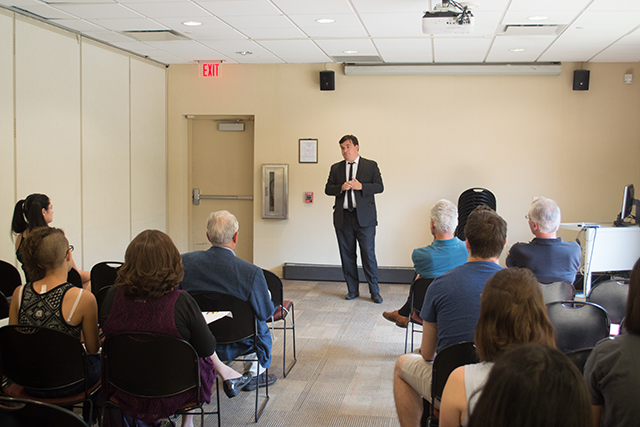
Photo by Hope Patti
On Tuesday, the Gross Center for Holocaust and Genocide Studies sponsored “Making Atrocity Prevention a Reality” in the Alumni Lounges. Ramapo welcomed Dr. Tibi Galis, the director of the Auschwitz Institution for Peace and Reconciliation as students from Dr. Michael Riff’s Paradigms of Genocide class listened and participated in discussing the profound impact Galis’ organization has on becoming a voice for governments to act on atrocity prevention.
The Auschwitz Institution, created in 2006, has four offices based both in and outside of the United States such as New York City, Argentina, Poland and Uganda. Although the Auschwitz Institution is a small organization made up of a body of just 22 people, millions of issues are covered and partnerships continue to grow. Galis’ organization utilizes financial, time and managerial resources which allows Auschwitz to see successful impacts toward raising awareness to prevent atrocities.
Galis, from Transylvania, found interest in atrocity prevention as he noticed a rapid change in Romanian politics which caused him to ask questions such as, “How are people’s lives affected by politics?” An example Galis provided was how new governments circa 1989 included people seeking justice for previous crimes and atrocities.
Galis asked the audience to think of the different ways we thought of atrocities in the 1980s versus how we think of them today. Historical atrocities were used as examples in the United States such as anti-immigration policies, slavery, Jim Crow laws and the Native American genocide. As Dr. Galis discussed the differences on various ways of thought he said there is always an agreement that genocide is a terrible experience, but the disagreement is on how to prevent them.
As director of the Auschwitz Institution, Galis works with police departments in the United States and focuses on improving training programs which allow prevention of racial profiling and police brutality specifically aimed towards young African American males. In Paraguay, land owners of rural areas faced victimization as they were forced to relocate in order for farmers to occupy their land.
“What we are doing is making sure nobody suffers the fate of the victims of the Holocaust today,” Galis said as he discussed the concerns which Auschwitz has faced. Concerns include the lack of information that is provided globally and the lack of political will to prevent atrocities. Galis explained that the solution for such a concern is education.
Galis closed the floor with an opportunity for the audience to have a Q&A at which one student asked, “Does a government find Auschwitz when a concern is raised about victimization or vice versa?”
Governments indeed find Auschwitz, and the organization’s job is then to empower "governments to act on atrocities provides stability,” Galis answered.
Dr. Riff commented on the event and provided insight towards how work such as Galis’ impacts his Paradigms of Genocide class.
“In this particular instance and generally, a talk like Dr. Galis’ creates a context for further discussion. It can raise questions afterwards and students are apt to remember points the speaker made to which the course professor can refer in class,” Riff said. “[Dr. Galis] opened our eyes to how much a small NGO [non-governmental organization], like the Auschwitz Institute for Peace and Reconciliation, can accomplish working in conjunction with experts and local government authorities to avert mass atrocities, like genocide. The way in which a well delivered talk on an important subject can retain a student audience’s attention.”
kbruno4@ramapo.edu






